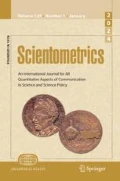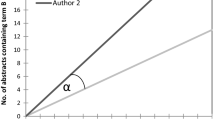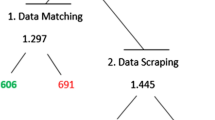Abstract
A bibliometric approach is explored to tracking international scientific migration, based on an analysis of the affiliation countries of authors publishing in peer reviewed journals indexed in Scopus™. The paper introduces a model that relates base concepts in the study of migration to bibliometric constructs, and discusses the potentialities and limitations of a bibliometric approach both with respect to data accuracy and interpretation. Synchronous and asynchronous analyses are presented for 10 rapidly growing countries and 7 scientifically established countries. Rough error rates of the proposed indicators are estimated. It is concluded that the bibliometric approach is promising provided that its outcomes are interpreted with care, based on insight into the limits and potentialities of the approach, and combined with complementary data, obtained, for instance, from researchers’ Curricula Vitae o, survey or questionnaire- based data. Error rates for units of assessment with indicator values based on sufficiently large numbers are estimated to be fairly below 10 %, but can be expected to vary substantially among countries of origin, especially between Asian countries and Western countries.






Similar content being viewed by others
References
Abramo, G., D’Angelo, C. A., & Solazzi, M. (2012). A bibliometric tool to assess the regional dimension of university-industry research collaborations. Scientometrics, 91(3), 955–975.
Baruffaldi, S. H., & Landoni, P. (2012). Return mobility and scientific productivity of researchers working abroad: The role of home country linkages. Research Policy, 41(9), 1655–1665.
Biondo, A. E. (2012). What’s up after brain drain? sometimes, somewhere, someone comes back: A general model of return migration. International Review of Economics, 59(3), 269–284.
Di Maria, C., & Lazarova, E. A. (2012). Migration, human capital formation, and growth: An empirical investigation. World Development, 40(5), 938–955.
Gutiérrez-Vela, M. M., Díaz-Haro, A., Berbel-Salvador, S., Lucero-Sánchez, A., Robinson-García, N., & Cutando-Soriano, A. (2012). Bibliometric analysis of research on regenerative periodontal surgery during the last 30 years. Journal of Clinical and Experimental Dentistry, 4(2), 112–118.
Laudel, G. (2003). Studying the brain drain: can bibliometric methods help? Scientometrics, 57, 215–237.
Moed, H. F., Aisati, M., & Plume, A. (2013). Studying scientific migration in scopus. Scientometrics, 94, 929–942.
Plume, A. (2012). The evolution of brain drain and its measurement: Part I. Research Trends, (26). (http://www.researchtrends.com/issue26-January-2012/the-evolution-of-brain-drain-and-its-measurement-part-i/).
Plume, A. (2012). The evolution of brain drain and its measurement: Part II, Research Trends, (27). (http://www.researchtrends.com/issue-27-March-2012/the-evolution-of-brain-drain-and-its-measurement-part-ii/).
Snaith, B. (2012). Collaboration in radiography: A bibliometric analysis. Radiography, 18(4), 270–274.
Yang, C. C., & Tang, X. (2012). A content and social network approach of bibliometrics analysis across domains. Paper presented at the ACM International Conference Proceeding Series (pp. 515–517). ACM.
Acknowledgments
The authors wish to thank the useful comments made by anonymous referees.
Author information
Authors and Affiliations
Corresponding author
Rights and permissions
About this article
Cite this article
Moed, H.F., Halevi, G. A bibliometric approach to tracking international scientific migration. Scientometrics 101, 1987–2001 (2014). https://doi.org/10.1007/s11192-014-1307-6
Received:
Published:
Issue Date:
DOI: https://doi.org/10.1007/s11192-014-1307-6




